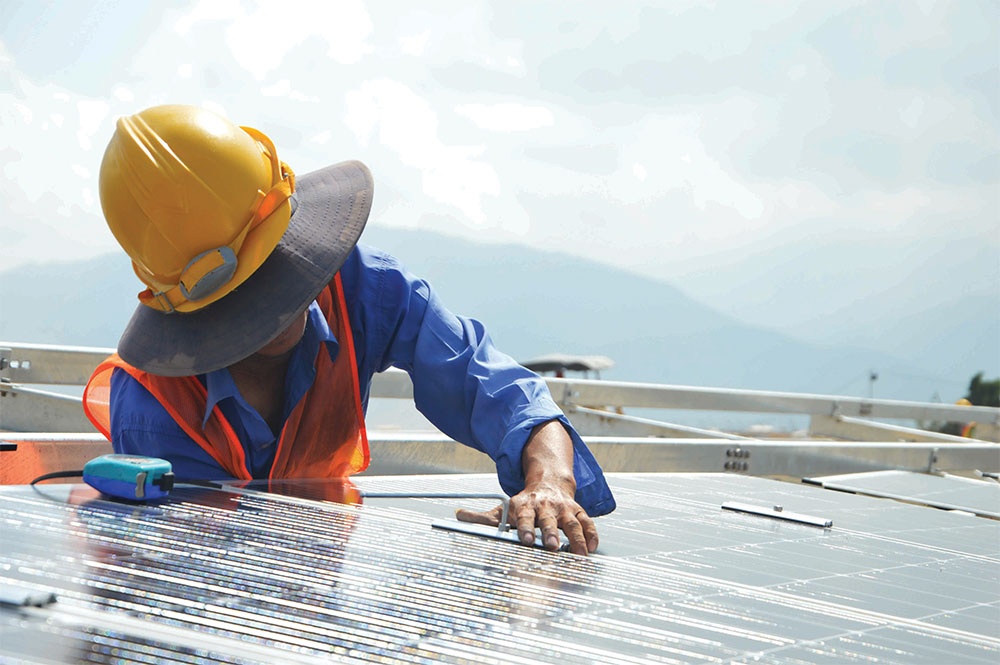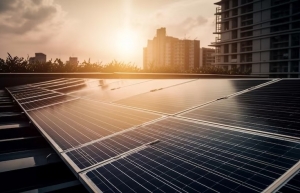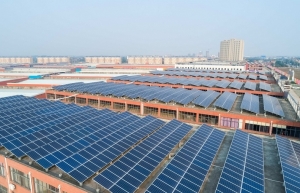No profit gain for excess rooftop power
The Ministry of Industry and Trade (MoIT) proposed a draft decree in December, recommending individuals invest in self-use rooftop solar power connected to the national electricity system. Any surplus power generated will be purchased by Vietnam Electricity (EVN) at no cost, since excessive electricity can compromise the security and safety of the power grid. Vietnam has installed approximately 200MW of rooftop solar power systems over the past three years.
 |
| Rooftop solar energy provides a viable complement to the nation’s current power sources, photo Le Toan |
As per the MoIT, state oversight and management are required to guarantee the safety of operations. Solar energy is contingent on weather and solar radiation, both of which are unpredictable. Cloud cover, precipitation, or nocturnal conditions can cause the national grid to maintain sufficient electricity provision in the absence of solar radiation. This causes the system to experience rapid fluctuations, increases, and decreases, resulting in an unstable background power source.
The MoIT is concerned that any capacity exceeding 2,600MW could potentially have an impact on the power structure of the system. As of July, over 1,000 rooftop solar power systems stood connected to the grid, collectively possessing a capacity of 400MW, awaiting their inclusion in the planning process. The power grid is connected to all the remaining capacity. By 2030, only about 2,200MW will remain.
Vietnam’s utilisation of novel and renewable energy sources is in its infancy. Dr. Tran Van Binh, an associate professor at the Department of Energy Economics at Hanoi University of Science and Technology’s School of Economics and Management, said that the challenging storage system was the primary impetus for MoIT to propose a new policy.
“The MoIT’s new proposals prohibit the purchase and sale of rooftop solar energy outside EVN. Certain nations, including the US and Singapore, are presently capable of storing up to 200MW of electricity. However, Vietnam may require an additional 10-20 years to attain that level,” Binh said.
Installing solar energy on the rooftops of factories, production facilities, and commercial establishments provides a viable and environmentally friendly complement to Vietnam’s current power sources.
“There, the duty of the government is to give heed to the performance of solar energy equipment to guarantees of durability and the capacity to recoup capital associated with the initiative,” Binh added.
He added that the government should opt for a fresh approach, especially for the north, and implement price subsidies to encourage individuals to invest in rooftop solar power.
The economy’s demand for electricity will cause the northern region to continue experiencing electricity shortages during the summer of 2024. According to Dr. Ngo Duc Lam, former deputy director of the Institute of Energy at the MoIT, the new mechanism proposed by the industry would result in firms losing the output sent to the national electricity system due to the absence of recorded and paid costs.
“This is especially true when purchasing electricity for nothing,” he said. “The objective of formulating the aforementioned policy is to further advocate for the merits and benefits of rooftop solar power, which meets electricity demand with pure energy sources installed on-site. The necessity to install rooftop solar power systems is true, particularly for enterprises.”
It is necessary to satisfy energy requirements, achieve a portion of energy self-sufficiency, and supply pure electricity for green production. As a result, policies must optimise and capitalise on this energy source, as the demand for electricity may surge significantly in the near future.
He believes that by researching a compensation mechanism or purchasing at off-peak pricing, the MoIT can incentivise businesses to deploy the system while also contributing to cash flow. Undoubtedly, to accomplish this, the government must implement a synchronous dismantling policy that aids in system regulation, reduces costs, and provides additional electricity sources to sustain economic growth and human life.
 | Rooftop solar plans may stifle industry The Ministry of Industry and Trade is proposing to encourage rooftop solar power in offices and homes – but not in service and production businesses or industrial zones, which has caused concern for foreign and local producers in implementation of carbon reduction commitments. |
 | Rooftop solar encouragement to come via policies The Vietnamese government has been requested to issue a decree encouraging rooftop solar development, with implementation of unlimited capacity requirements contingent upon advances in storage tech and investment initiatives. |
What the stars mean:
★ Poor ★ ★ Promising ★★★ Good ★★★★ Very good ★★★★★ Exceptional
Related Contents
Latest News
More News
- Trung Nam-Sideros River consortium wins bid for LNG venture (January 30, 2026 | 11:16)
- Vietnam moves towards market-based fuel management with E10 rollout (January 30, 2026 | 11:10)
- Envision Energy, REE Group partner on 128MW wind projects (January 30, 2026 | 10:58)
- Vingroup consults on carbon credits for electric vehicle charging network (January 28, 2026 | 11:04)
- Bac Ai Pumped Storage Hydropower Plant to enter peak construction phase (January 27, 2026 | 08:00)
- ASEAN could scale up sustainable aviation fuel by 2050 (January 24, 2026 | 10:19)
- 64,000 hectares of sea allocated for offshore wind surveys (January 22, 2026 | 20:23)
- EVN secures financing for Quang Trach II LNG power plant (January 17, 2026 | 15:55)
- PC1 teams up with DENZAI on regional wind projects (January 16, 2026 | 21:18)
- Innovation and ESG practices drive green transition in the digital era (January 16, 2026 | 16:51)

 Tag:
Tag:




















 Mobile Version
Mobile Version